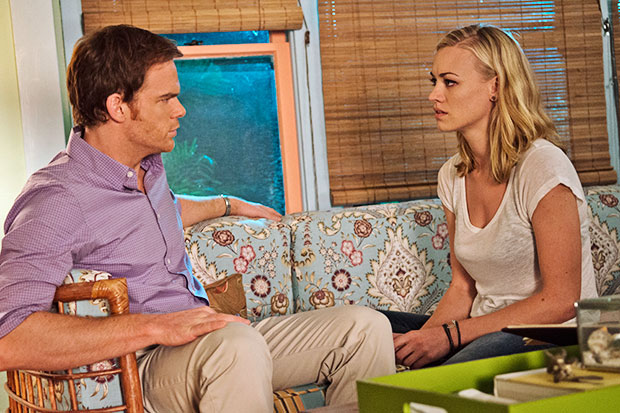
There’s a phantom on the loose in Miami. And no, I don’t mean the newest serial killer nicknamed The Phantom who sets people on fire and signs his crime scenes with the phrase “it’s Bobby.” We mean the phantom that is this show’s connective tissue—the reasoning behind why Dexter is who he is, really. The thing at the center of this show: Dexter’s ~Dark Passenger~. For most of this show’s lifetime, Dexter’s phantom reasoning has always hung in the balance of his following of The Code. Until now.
Tonight’s episode of Dexter focuses heavily on everyone’s favorite serial killer coming to terms with who he is and what he does. You see, Dexter’s always known he’s a killer, but the murderous blame could always be placed on his Dark Passenger because “it’s like this thing living inside me telling me what to do, leaving me without a choice.” But tonight, he realizes that he does, in fact, have a lot of choice: and he chooses, man. Perhaps in a way that sets the stage for the likely downfall of Dexter Morgan.
The idea of choice is something interesting to Dexter’s psyche. He’s always believed that his urges were a part of him he couldn’t change, merely contain—hence The Code. Dexter has always disassociated himself from this need to kill because it made things easy. All this time, he never realized what it’s always been: a feeling. And when Dexter realizes that he’s actually to blame for his murderous ways, he has a bit of an existential crisis.
When you treat your bad qualities (ha!) as a separate entity from your own person, it certainly makes it easier to sleep at night. It wasn’t me, it was my Dark Passenger, you guys! It’s also what makes Dexter the character you actually want to see kill again—because he’s killing bad people! Treating it as a separate being allows the audience to accept his behavior as something good. When he’s off the Dark Passenger’s clock, he seems like a fairly normal (albeit terribly incapable of emoting) person who just wants to raise his kid and live his life. When Dexter finally decides to love someone else, it leads the audience to think: maybe this is it, maybe since he’s really in love this time, he’ll be able to reevaluate his life and live it normally. But that’s not what Dexter really is—he’s a killer. He’s a murderer of the serial variety: same as his girlfriend who has so much influence over him now. And it’s not a ~Dark Passenger~ that controls his need to kill: it’s his own free will that he’s given a ridiculous f**king name to that catches all the blame for his horrific actions. When Dexter realizes it, that’s when s**t really hits the fan.
While breaking into the Juvenile Records office to uncover the identity of The Phantom, Dexter and his father discuss his Dark Passenger. Dexter thought it was his father that gave him the term, but Harry remembers it differently: he only gave Dexter The Code. Everything else was Dexter’s doing. Dexter always thought that the “it” that got into him “too early” was the Dark Passenger, but Harry only meant the trauma from his gruesome beginnings as a child who witnessed his mother’s death. The Dark Passenger is no more real than the Harry figments Dexter so frequently waxes philosophically with in every episode. It’s all Dexter: always has been, always will be. For someone who says that everything is under his control, he sure has no control over his own emotional needs. Hypocrisy much, Dexy? How can you say everything’s under your control and then say that your Dark Passenger is completely uncontrollable? It’s a human emotion, and free will means that you can control your own actions. Now he has to accept that he wants to kill, not that he needs to kill.
We hate to say it, but without Isaak Sirko around to help Dexter learn and discover the inherent mystery of human emotions, it seems doubtful that he’ll recover from the influence of Hannah McKay. As much as Isaak was a bad guy, he at least understood that the complexities of human emotion and logic are uncontrollable. And Isaak’s relationship with our less-lovable-by-the-minute serial killer was one that constantly challenged Dexter’s thought process. He could’ve learned a lot from Isaak. With Isaak’s death, though, we see that the metaphorical Pandora’s Box has been opened, but now only Hannah McKay has the power to influence’s Dexter’s understanding of it. And let me tell you: two serial killers don’t make a right.
PHOTO: TV’s Most Shocking Deaths
Dexter’s code has long held his cover together: when you’re only killing bad guys that people don’t like, it’s easier to get away with—especially when you work for the homicide division of a major city’s police force. But Hannah has continually undone Dexter’s Code this entire season: he’s done for her things he never would’ve done before. Ever. Seriously—the Dexter of season seven is unlike any other Dexter we’ve seen before. He’s compulsive, a bit irrational, and seriously on edge. Compare the relationship of Dexter and Hannah to that of Dexter and Rita: there was always a disassociated quality in his relationship with Rita. I mean, s**t, he could barely kiss her without being confused and maybe even a little bit grossed out by the animalistic nature of sex-having. With Hannah, none of that is the case.
The animal nature of humans is something beyond Dexter’s comprehension and ultimately, control. And we all know homebody is a control freak extraordinaire. He’s said it multiple times this season: everything is under his control. Oh, what a misguided man he is, huh? Everything is about control and logic, and those threads of rationality (sometimes overly so), have always kept Dexter together. But this season we’ve seen Dexter confronted with the fallacy in his own logic. Human nature is illogical. Love is illogical. Control of everything is impossible. And it all culminates in Dexter’s murder of Hannah’s father, Clint McKay.
Dexter’s serial killer side isn’t a need: it’s a want. It’s always been a want. And when Dexter kills Clint McKay, it’s not because he’s a murderer who got away with it and escaped the system (he’s not): it’s not even because he’s a pretty terrible guy (he was a real s**t in the Dad department). It’s because he can. He wants to. Dexter can kill Clint McKay because he doesn’t have to follow his Dark Passenger. He realizes that he can, in fact, follow his heart, his gut, his emotions: he can follow anything he wants because that’s the nature of free will, of humanity. And, because emotionally, that’s what he wants to do, because he loves Hannah. You can see the slight fear in Hannah’s eyes when they embrace at the end: Hannah has created a monster. Grew him up just like one of her little flowers. (She’s good at her job, that one!) And there’s no turning back now.
Overall, the episode wasn’t the strongest (it had quite a few eye-rolling moments), but it did what it had to do. Some other plot lines of note:
1.) LaGuerta’s Onto It: Like we said before, we knew Dexter would be discovered by LaGuerta, and he pretty much has been. She finds out his motive/backstory, and connects the dots for all of it. Bringing former Chief Matthews in has really clarified her thinking and her approach to the case. No doubt this will come into play heavily in the last two episodes of the season. LaGuerta is not going into this without a lot of back-up: evidentiary and otherwise. Smart move, LaGuerta. Bomb, we’re waiting for you to be dropped.
2.) Nadia and Quinn, Sittin’ in a Tree: These two are bad news for each other: especially Nadia for Quinn. We’re sensing a parallel here, between Dexter and Quinn: each one’s downfall will be their respective ladyfriend, to an extent. Quinn’s covering up murders (bye, George!) and lying to his coworkers about who shot first and who were witnesses. That’s going to end very, very badly.
3.) Deb Wants to Nail Hannah: Another one who won’t give it a rest is Deb: she’s going to take Hannah down for murder, to avenge Sal Price’s death. It all feels a bit heavy-handed, but I guess that’s what happens when you need to find someone to place all your pent-up anger and frustrations on when you’re too afraid to rat your brother out for being the Bay Harbor Butcher. Deb’s decision to go after Hannah instead of Dexter is exactly the same as when Dexter changes his mind to kill Clint rather than The Phantom. Expect Clint’s call to Miami Metro about the counselor she murdered at summer camp to be Hannah’s undoing, as well.
4.) The Phantom and Phil Bosso: Of course Dexter thinks, at first, that Phil Bosso is The Phantom—a thought he later disproves. He’s literally the Dexter of the Fire Department. Creepy, disassociated, unflinching in the face of human horror. It almost seems like Dexter believes, on some subconscious level, that people are more like him than they actually are. Sure, Bosso is creepy as f**k, but he’s not a murderer. Not everyone with an obsessive skill set and knowledge base is a serial killer, Dexter. You’re not as normal as you might think.
What do you think of this newest, darkest turn? Do you agree that we’ve begun to see the beginning of the end of Dexter Morgan? Sound off in the comments!
[Photo Credit: Showtime]
Follow Alicia on Twitter @alicialutes
More:
‘Dexter’ Recap: Out of Control
‘Dexter’ Recap: What’s Love Got to Do With It?
‘Dexter’ Recap: Matters of the Heart
’Friday Night Lights’ Movie Not Likely, Says Zach Gilford — EXCLUSIVE
 ’Les Mis,’ ‘Dark Knight,’ and More: The Best Trailers of 2012
’Les Mis,’ ‘Dark Knight,’ and More: The Best Trailers of 2012



